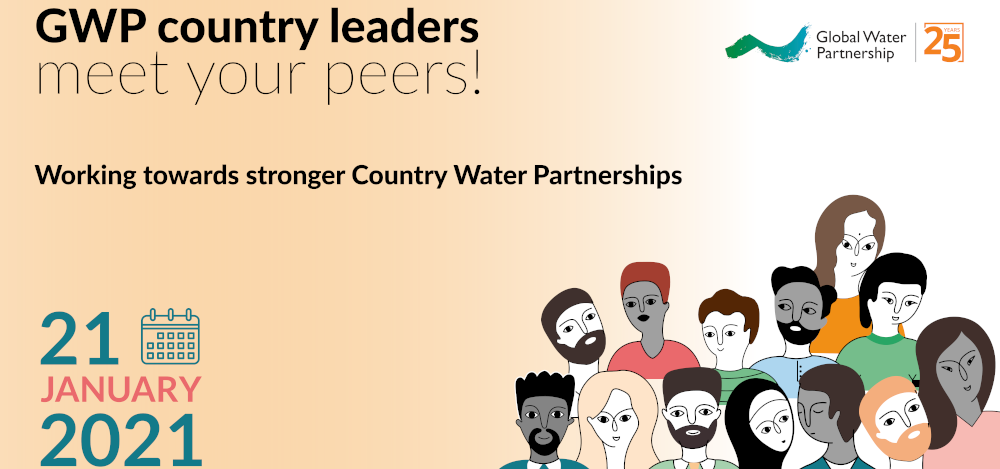The country platforms are multi-stakeholder platforms that bring together GWP Partner organisations from government, NGOs, academia, private sector, etc. They provide a forum for dialogue, consensus building, and commitment towards advancing water security though Integrated Water Resources Management. Different models of these platforms exist within the network, the main one being the model of CWPs. GWP currently has 69 CWPs.
The 2020 – 2025 GWP Strategy identifies the strengthening of CWPs as critical for GWP to reach its vision of a water secure world. This was emphasized by GWP Interim Chair Peter Repinski in his welcoming message: “The CWPs have always played a crucial role for the successes and achievements of our organisation, and it is with pride and appreciation that we now share the opening of our 25th Anniversary celebrations with you.”
In addition to providing a learning opportunity for the country leaders, the event aimed to enhance their sense of belonging to, and benefiting from, a global network and community.
The event was arranged in two separate sessions to accommodate for different time zones. In each session, two CWPs shared experiences.
Zelina Ibrahim, Vice-Chair of GWP Malaysia, told the story of how water sector actors started collaborating in 1993 and have built through GWP an important platform for improving water resources management in the country. She described key approaches implemented to grow the platform, including strategic positioning and leadership, as well as building institutional and administrative capacity. Today, GWP Malaysia consists of 59 Partners.
Victor Kongo, Executive Director of GWP Tanzania, asked participants to consider critical questions that should guide the building of CWPs - where do the CWPs stand in terms of relevancy, ownership, sustainability and responsibility, and identity and belonging? He shared Tanzania’s journey in becoming a strong and impactful CWP, emphasizing the importance of leadership and championing, and the development of strategic partnerships.
Valdemeira da silva Tavares, Chair of GWP Sao Tome Principe, presented the origins of the CWP, which was founded in 2008, and shared an overview of the activities that the CWP has implemented. An important strength of the CWP is that it is well recognized today in the landscape of actors in the country. This has been made possible through close collaboration with key institutional and development actors, as well as formal recognition within the national federation of NGOs.
Carmen Gonzales, Chair of GWP Nicaragua , shared good practices and lessons learned. For instance, she highlighted the need to understand the concerns of the partners, to identify common interests, and to promote collaboration through different means, including working groups or virtual platforms. The partners also need encouragement to identify actions of interest and integrate them into their own work plans.
After the presentations, the participants broke into smaller groups that discussed partner engagement strategies for building effective multi-stakeholder country water platforms; the process of identifying stakeholders, grouping them according to interest and power, and how to best communicate with each of these groups. All the discussions are summarized in visual presentations (in the right-hand column of this page).
The country platform leaders exchange is part of a broader effort that focus on how to strengthen the CWPs and multi stakeholder platforms for water governance change.

